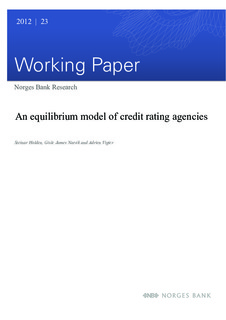An Equilibrium Model of Credit Rating Agencies
Working paper
Published version
Permanent lenke
http://hdl.handle.net/11250/2496816Utgivelsesdato
2012Metadata
Vis full innførselSamlinger
Sammendrag
We develop a model of credit rating agencies (CRAs) based on reputation concerns. Ratings affect investors' choice and, thereby, also issuers' access to funding and default risk. We show that - in equilibrium - the informational content of credit ratings is inferior to that of CRAs' private information. We find that CRAs have a pro-cyclical impact on default risk: in a liquidity boom CRAs help resolve investors' coordination problem, and lower the probability of default; in a liquidity crunch CRAs raise the probability of default. Furthermore, rating standards tend to be pro-cyclical, while biased CRA-incentives will ultimately be self-defeating.

